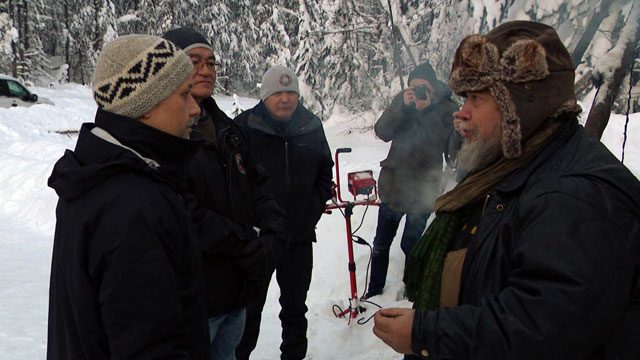
B.C. Green Party interim leader Adam Olsen was in Wet’suwet’en territory Saturday to meet with hereditary chiefs and tour the blockades on the Morice River Forest Service Road near Houston, B.C.
“I thought it was important for the Green Party and all parties to come out here and actually stand on the land, breathe the air, know what we’re protecting,” said hereditary Chief Na’Moks, who invited the Green Party to the territory.
“It’s so beautiful, it’s so pristine out here. Why would you want to destroy it?”
Olsen, a member of Tsartlip First Nation, visited a small support camp at the 30-km mark just past the RCMP exclusion zone at 27 km that went up Jan. 13.
RCMP describe the road block as a “checkpoint.”
Olsen said in order to move forward there needs to be a stronger relationship between Canadian and traditional Indigenous leadership.
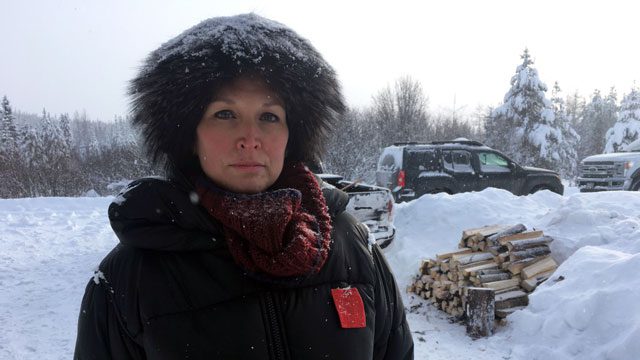
(Molly Wickham is a Gidimt’en Clan member in the Wet’suwet’en Nation. Damian Joseph/APTN )
“This is a situation that has played out across this country over and over again and for me it’s heartbreaking.”
On Jan. 13, B.C. Premier John Horgan said “the rule of law” must be followed to allow construction of the $6.6-billion, Coastal GasLink (CGL) project to proceed despite protests.
He pointed out the natural gas pipeline from Dawson Creek to the planned LNG Canada export terminal near Kitimat has approvals of the B.C. Supreme Court, regulatory agencies and elected Wet’suwet’en chiefs.
But Olsen said Horgan’s comments “highlight the willingness to put Indigenous law and Indigenous interest outside the Canadian interest.”
Horgan turned down Wet’suwet’en hereditary chiefs’ invitation to visit the territory while he was in northern B.C. last week.
“We believe that’s highly disrespectful,” said Na’Moks, whose non-traditional name is John Ridsdale.
“So much can be accomplished by having proper communication.”
Olsen said it’s important to be engaged on these issues and was honoured to be invited into the territory.
While Olsen met with Wet’suwet’en members, camp supporters began building a new camp at 27 km to keep an eye on the RCMP.
Camp spokesperson Molly Wickham said the police exclusion zone is still “presenting a huge hassle” for supporters to access the camps.
“I don’t believe for a second that it’s for public safety,” she said.
“I think it’s more to control and do surveilance on our people.”
The 670-km pipeline will run for nearly 200 km through traditional Wet’suwet’en territory.
APTN NEWS AT CAMP
Upon arrival at the police barrier on Morice River Forest Service Road, south of Houston, APTN’s video journalist and camera operator were asked by RCMP to provide identification.
Officers warned them about snow and damaged trees on the road that were undercut and weakened, and could potentially fall at any point.
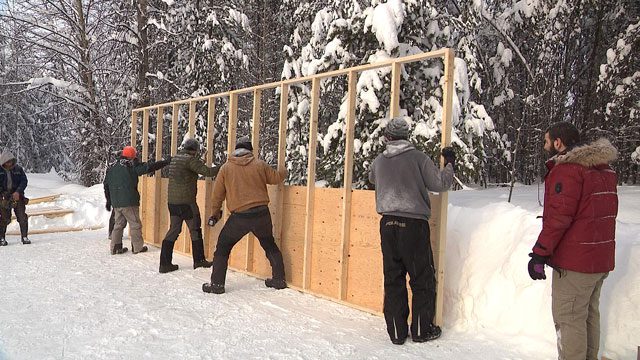
(Supporters help erect a new camp outside the RCMP exclusion zone. Damian Joseph/APTN)
Thirty-nine km up the road is a smaller camp to monitor RCMP activity and receive donations for the main camps.
In order to access the Gidimt’en and Unist’ot’en camps, the APTN crew was told it would have to hike for roughly four km and be picked up by snowmobile to continue.
APTN received permission from the hereditary chiefs to visit the camps, but has not been able to organize transportation with camp spokespeople.
READ MORE: A look at the conflict in the Wet’suwet’en Nation








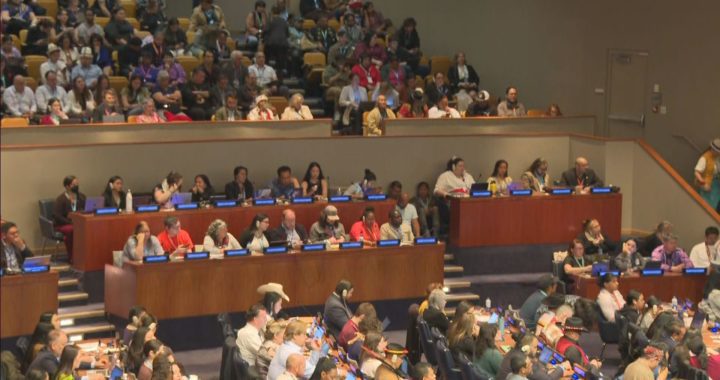
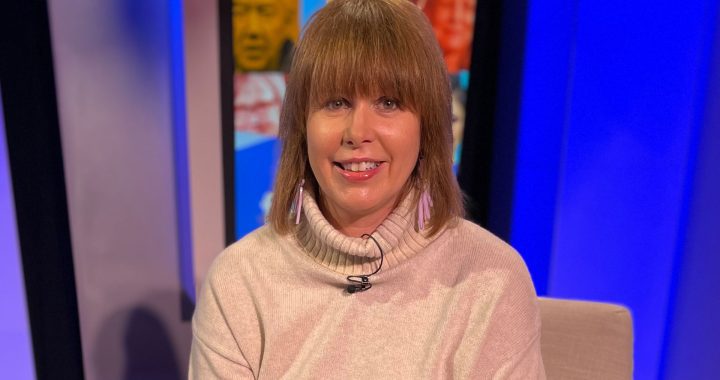
Thank you for the update Adam,
It would
appear that little has changed with government policy from party to party. Many
British Columbians did not support the governments’ heavy handed position the
last time around and they do not support the involvement of the RCMP this time
around, nor was any taxpayer provided any opportunity to question the wisdom of
investing billions of dollars expanding fossil fuel projects in the first
place.
Standing
strong First Nations are our last hope to save this province from becoming an
industrial waste land. Super Natural British Columbia is the governments’
favorite slogan but in reality, the protection of the environment is the last
thing on their agenda. Until
politicians realize money doesn’t fix global warming, it causes it, backward thinking
positions are the greatest threat to the future for all of us. To coerce First
Nations with the option of continued poverty is not only disgraceful it is the
definition of an unconscionable contract.
Be brave be strong, but know you’re outgunned, violence doesn’t win you friends, video and microphones will. Peace be with you.
Nice to see some political leadership in BC – for a change. It seems that other leaders only want to be leaders when they’re invited to corporate board rooms: coffee must be really good, huh?